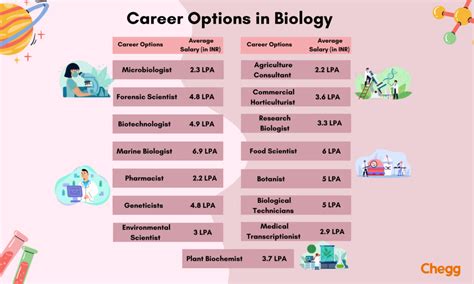The Bachelor of Science in Biology (B.S. Biology) unfolds the captivating world of living organisms for aspiring scientists. This diverse degree paves the way for a wide spectrum of fulfilling careers in the vibrant realm of life sciences. From unraveling the mysteries of human health to safeguarding the planet’s biodiversity, graduates equipped with a B.S. Biology are poised to make a tangible impact in various fields.

According to the U.S. Bureau of Labor Statistics (BLS), employment opportunities for biological scientists are projected to grow by 6% from 2021 to 2031, with approximately 10,100 new positions added annually. This growth is fueled by the increasing demand for professionals who can analyze, interpret, and disseminate biological data in healthcare, environmental protection, and biotechnology industries.
Key Job Titles and Responsibilities
- Biological Scientist: Conduct research, analyze biological data, and develop solutions to real-world problems in areas such as disease prevention, environmental conservation, and agricultural productivity.
- Biomedical Scientist: Focus on the application of biological principles in medical research and the development of diagnostics, therapeutics, and treatments for various diseases.
- Environmental Scientist: Monitor and protect natural ecosystems, assess environmental impacts, and develop strategies for sustainable resource management.
- Laboratory Technician: Assist scientists with experiments, analyze samples, and operate laboratory equipment in various settings such as hospitals, research institutions, and biotech companies.
- Health Educator: Promote healthy behaviors, provide health information, and educate the public on disease prevention and health promotion practices.
The median annual salary for biological scientists was $86,450 in May 2021, according to the BLS. The top 10% of earners made more than $138,560, while the bottom 10% earned less than $47,730.
Job growth by industry:
– Healthcare and social assistance (22%)
– Research and development (18%)
– Educational services (15%)
– Government (12%)
The B.S. Biology degree offers various specialization options, allowing students to tailor their education to their specific career aspirations. These specializations include:
- Biochemistry: Study the chemical processes and reactions that occur within living organisms.
- Cell and Molecular Biology: Delve into the structure, function, and interactions of cells and their components.
- Genetics: Explore the inheritance and variation of traits, including molecular genetics and population genetics.
- Ecology and Evolution: Investigate the interactions between organisms and their environment, as well as evolutionary processes over time.
- Microbiology: Study microorganisms, their growth, metabolism, and applications in areas such as medicine and biotechnology.
- Physiology: Focus on the functions and mechanisms of living organisms, including human physiology and the physiology of other organisms.
Biomimicry, the art of imitating nature’s designs, is an emerging field that offers exciting applications for B.S. Biology graduates. By studying biological structures and processes, scientists can design innovative solutions for various challenges, such as:
- Creating stronger, more durable materials inspired by the robust structures of seashells.
- Developing energy-efficient technologies based on the photosynthetic capabilities of plants.
- Designing medical devices that mimic the healing mechanisms of living organisms.
- Analytical Thinking: Ability to critically analyze and interpret biological data.
- Laboratory Skills: Proficiency in laboratory techniques and equipment.
- Communication Skills: Ability to effectively communicate scientific findings orally and in writing.
- Problem-Solving Skills: Capacity to identify and solve biological problems.
- Computer Literacy: Familiarity with statistical software and database management systems.
With experience and further education (e.g., a Master’s degree or PhD), B.S. Biology graduates can climb the career ladder and assume leadership roles such as:
- Research Director
- University Professor
- Medical Doctor
- Environmental Regulatory Specialist
- Biotechnology Executive
- Public Health Administrator
- Gain practical experience: Participate in research internships, volunteer in labs, and attend industry conferences.
- Develop strong networking skills: Join professional organizations and attend industry events to connect with potential employers.
- Stay updated on the latest scientific advancements: Read scientific journals, attend workshops, and take continuing education courses.
- Build a strong foundation in mathematics and statistics: These skills are essential for analyzing and interpreting biological data.
- Explore career options beyond academia: There are numerous opportunities for B.S. Biology graduates in government agencies, industry, and healthcare settings.
A Bachelor of Science in Biology is a versatile degree that opens doors to an array of rewarding career paths in the life sciences. With its focus on scientific inquiry, analytical thinking, and problem-solving, this degree prepares graduates to tackle complex biological challenges and make a positive impact on the world. By staying abreast of emerging technologies and leveraging their skills and knowledge, B.S. Biology graduates are well-positioned to succeed in the dynamic and ever-evolving field of biology.
Table 1: Projected Job Growth for Biological Scientists by Industry
| Industry | Projected Growth (2021-2031) |
|---|---|
| Healthcare and social assistance | 22% |
| Research and development | 18% |
| Educational services | 15% |
| Government | 12% |
Table 2: Median Annual Salaries for Biological Scientists (May 2021)
| Education Level | Median Annual Salary |
|---|---|
| Bachelor’s degree | $86,450 |
| Master’s degree | $99,320 |
| PhD | $113,470 |
Table 3: Common Career Paths for B.S. Biology Graduates
| Career Path | Description |
|---|---|
| Biological Scientist | Conduct research and analyze data in various biological fields. |
| Biomedical Scientist | Develop and test new medical treatments and diagnostics. |
| Environmental Scientist | Protect and manage natural ecosystems. |
| Laboratory Technician | Assist scientists with laboratory experiments. |
| Health Educator | Promote healthy behaviors and provide health information. |
Table 4: Skills and Competencies for B.S. Biology Graduates
| Skill | Importance |
|---|---|
| Analytical Thinking | Critically analyze and interpret biological data. |
| Laboratory Skills | Proficiency in laboratory techniques and equipment. |
| Communication Skills | Effectively communicate scientific findings orally and in writing. |
| Problem-Solving Skills | Identify and solve biological problems. |
| Computer Literacy | Familiarity with statistical software and database management systems. |
